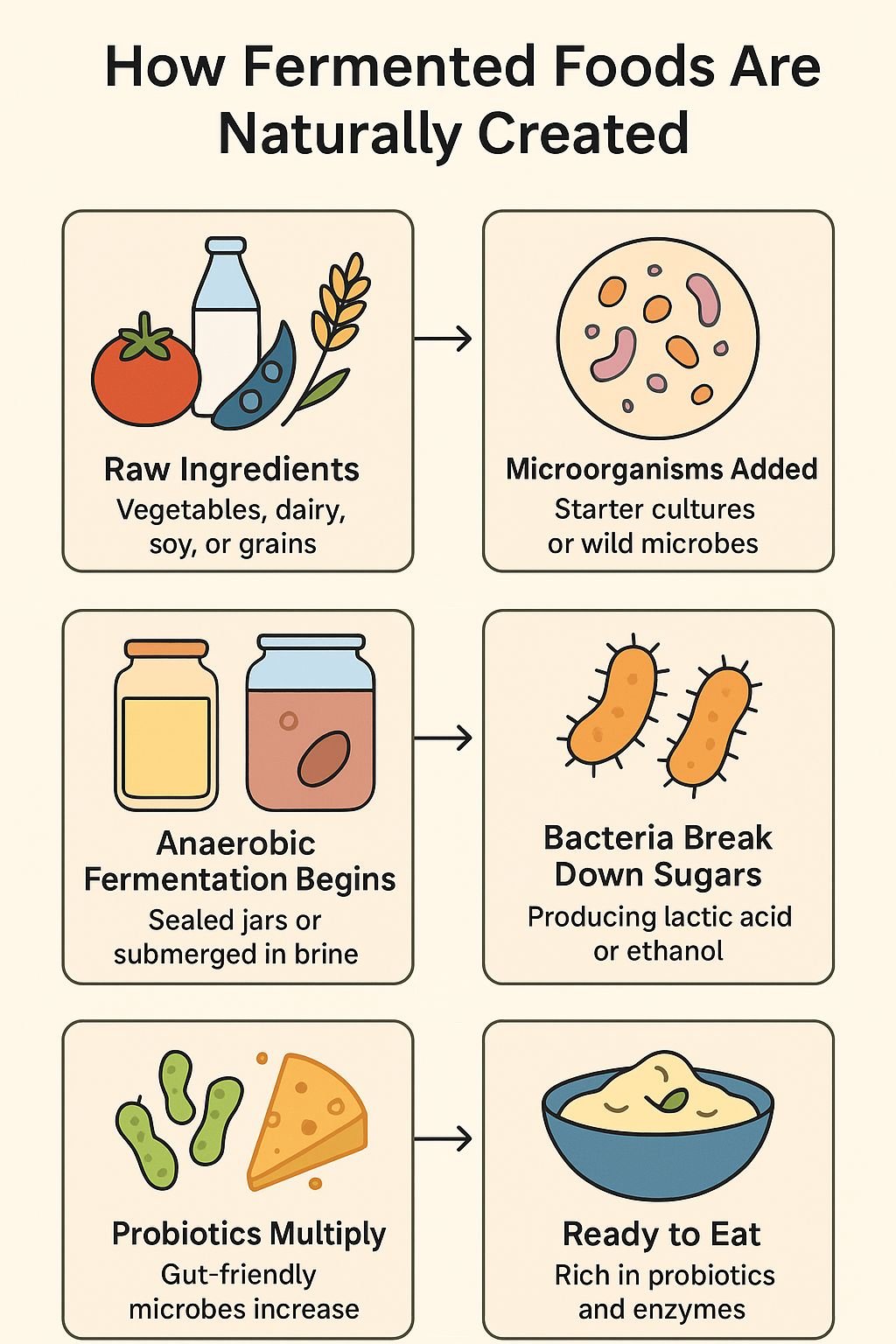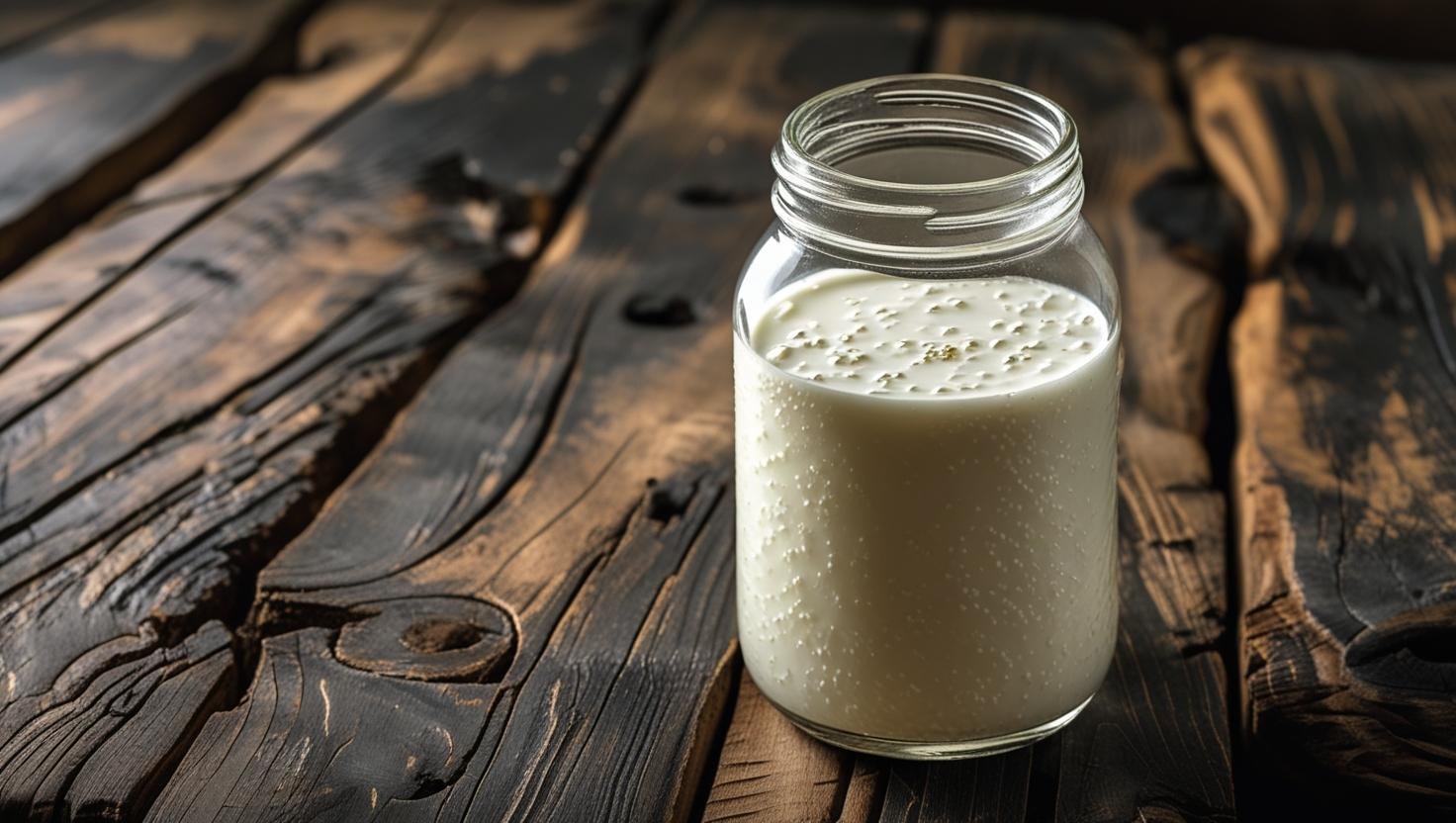In your gut, trillions of bacteria live. They influence everything from digestion to immunity to mood to inflammation. Fermented foods contain probiotics, which are live beneficial bacteria that help maintain a healthy microbiome. Fermented foods are a great way to improve gut health, reduce bloating, and boost overall well-being.
This guide includes a list of the top fermented foods, their benefits and how to eat them.
Table of Contents
What are fermented foods?
Fermented foods have been through a natural fermentation process, where bacteria and yeast degrade food components such as sugars or starches. This process preserves the food and produces beneficial acids, enzymes and probiotics that improve digestion.
How are fermented foods naturally created?
The fermentation process is the biological conversion of carbohydrates (sugars, starches, and other sugars) to alcohol or organic acids by microorganisms like bacteria, yeast, or fungi. This occurs under anaerobic conditions, which means without oxygen.

Here is a simple explanation of fermentation:
Natural Fermentation Process: Step-by-Step
1. Microorganisms are Introduced or Natural
Some food uses “starter cultures”, such as kefir grains, yogurt cultures, or sauerkraut. In contrast, other foods, such as kimchi or sauerkraut, depend on naturally occurring bacteria in the food or environment.
2. Fermentation begins in anaerobic conditions.
Food is stored in airtight containers or brine. This environment encourages the growth and development of beneficial bacteria.
3. Conversion from Sugars to Acids and Alcohol
- Lactic Acid Fermentation (commonly found in yogurt, sauerkraut, and kimchi) breaks down sugars to lactic acid.
- Alcoholic ferment (used to make kombucha and wine) converts sugars into carbon dioxide and ethanol.
4. Probiotic Bacteria Multiply
When fermentation proceeds, probiotic strains like Lactobacillus, Bifidobacterium, and Bacillus subtilis flourish, making the food rich with live cultures.
5. Texture and Flavour Change
Foods become tangy, fizzy or soft depending on their type.
Fermented Foods Benefits for Gut Health
- Replenish healthy gut bacteria.
- Enhance digestion and absorption of nutrients
- Immune system strengthening
- Reduce inflammation
- Balance gut microbiota
- IBS symptoms and bloating: How to manage them
By creating a balanced and diverse microbiome, adding a variety of fermented foods to your diet will positively impact gut health.
A Detailed List of Fermented Foods to Improve Gut Health
Explore each fermented food that has been scientifically proven to promote gut health. Many cultures around the world consume these foods and are readily available.
1. Yogurt

What is it?
A dairy product is made by fermenting the milk with live bacteria, most commonly Lactobacillus or Bifidobacterium.
Gut health benefits:
- Restores gut flora balance
- Improves lactose digestion
- Reduces IBS symptoms and bloating
Consumption:
Select plain yogurt without sugar and active cultures. Greek yogurt has a high concentration of probiotics and is also rich in protein.
2. Kefir

What is it?
Kefir, a fermented drink of milk similar to yogurt in consistency but with a thinner consistency. Kefir grains are used to make it. They contain bacteria and yeast.
Gut health benefits:
- It contains more probiotic strains than yogurt
- Supports gut repair and immunity
- Constipation, inflammation and pain relief
Consumption:
Kefir can be blended into smoothies or drunk daily. Choose water or dairy kefir depending on your dietary needs.
3. Sauerkraut
What is sauerkraut?
Sauerkraut is fermented with lactic acid bacteria.
Gut health benefits:
- Fibre and probiotics are high in this product
- Reduces bloating and promotes digestion
- Enhances nutrient absorption
Consumption:
Serve as a salad topping, a side dish or in sandwiches. Choose unpasteurized sauerkraut for maximum probiotic benefit.
4. Kimchi

What is it?
Kimchi, or Korean fermented vegetables, is made from cabbage, radish and garlic.
Gut health benefits:
- Probiotics and vitamins are packed into a delicious, nutritious drink
- Fighting inflammation in the gut
- Helps to regulate bowel movements
Consumption:
Add it to stir-fries or rice bowls. Look for raw, unpasteurized versions.
5. Tempeh

What is it?
A fermented soybean product from Indonesia. It has a firm consistency and a nutty taste.
Gut health benefits:
- Prebiotics and Probiotics
- Supports gut lining health
- Soya improves digestion
How you can consume it:
Slice, saute, or grill. Use in salads, sandwiches or stir-fry dishes.
6. Miso

What is it?
A fermented soybean paste widely used in Japanese cuisine.
Gut health benefits:
- Probiotics support the gut flora
- Rich in enzymes aiding digestion
- Reduces intestinal inflammation
Add miso to dressings or marinades, or add to soups. To preserve the probiotic content of miso, avoid boiling it.
7. Pickles (Fermented Pickles)
What is it:
Pickles fermented are cucumbers preserved with salty brine, instead of vinegar. This allows for natural fermentation.
Gut health benefits:
- Encourages the growth and development of beneficial bacteria
- Supports digestive enzyme production
Consuming:
Have a few pickles fermented daily, as a side or snack. Pickles that are “lactofermented” or “raw”, not those based on vinegar, should be sought out.
8. Kombucha

What is it?
Kombucha, a fermented beverage made with a SCOBY.
Gut health benefits:
- Supports liver detoxification
- Aids digestion, gut motility
- Helps regulate gut pH balance
Consumption:
100-150ml per day is a good starting point. For best results, choose raw kombucha with low sugar.
9. Natto

What is it?
Natto, a Japanese traditional fermented soy bean dish, is known for its strong taste and sticky texture.
Gut health benefits:
- This product contains Bacillus subtilis , which is beneficial to gut health
- Vitamin K2 is high in this product, which helps to support the gut lining.
- Reduces bloating and aids digestion
Consumption:
Serve with rice, on toast, or eggs. It is often served as breakfast in Japan.
10. Fermented Cheese
What is it:
Aged and fermented cheeses such as Gouda and Swiss are made using bacteria cultures.
Gut health benefits:
- Delivers strains such as Lactobacillus
- When consumed in moderation, it enhances gut flora.
Consume in moderation:
Combine with foods rich in fibre for better digestion support.
11. Lassi

What is it?
A traditional Indian yogurt drink that is often spiced with fruit or seasoned.
Gut health benefits:
- Refreshes gut microbiota
- Promotes better digestion after meals
- It soothes the stomach
Consume:
Drink plain lassi or spiced lassi after meals, particularly spicy or heavy ones.
12. Idli & Dosa
What is it?
Dosa and Idli are South Indian breakfast foods made with fermented rice batter and urad daal.
Gut health benefits:
- Light and easy to digest
- Natural fermentation supports gut flora
Consume with:
Sambar or chutney. Ideal for breakfast or as a light meal.
Add Fermented Foods To Your Diet
- Start slowly with small amounts (1-2 tablespoons, or a small mug).
- Fibre-rich foods feed probiotics.
- Choose a variety to suit diverse gut flora
- Probiotics should be stored properly to ensure viability.
- Pasteurized products should be avoided whenever possible.
Considerations and Precautions
- Slowly introduce fermented food to people with histamine intolerance
- Check labels to make sure that the fermented food you buy at the store contains live cultures
- Gas or bloating may result from excessive consumption
- Consult your doctor if you are taking antibiotics or immunosuppressive drugs
Recap for fermented foods and gut health
Include fermented food in your diet daily. It is the simplest and most natural way to maintain and repair gut health. Fermented foods provide the gut with healthy bacteria that it needs to flourish, balance your microbiome, and improve digestion. There’s a fermented option for everyone, whether you like dairy, vegetables, or drinks. Consistency is the key. Make them a regular component of your diet to reap long-lasting benefits.
Disclaimer
This article is intended for informational purposes and does not constitute medical advice, diagnosis or treatment. Consult a registered dietitian or qualified healthcare professional before making any changes in your diet. This is especially important if you are pregnant or have underlying health conditions. Fermented foods may support gut health, but individual reactions can vary. This information is based upon publicly available research as well as general wellness guidelines.
Fermented Foods FAQs for Gut Health
How often should I consume fermented food for gut health?
1-2 servings a day will suffice to maintain a healthy microbiome. Moderation and variety should be balanced.
Can fermented food help with gas and bloating?
Fermented foods do contain beneficial bacteria, which aid digestion, reduce bloating and gas over time.
Are fermented foods all probiotics?
No. Only probiotics that contain active, living cultures will provide benefits. Always read labels.
Can pregnant women eat fermented food?
Fermented foods, such as yogurt and kefir, are generally safe for pregnant women. Speak to your doctor about safety.
Do kids need to consume fermented food for good gut health?
Yes. In moderation. Idli, Dosa, Kefir, and Yogurt are all great options for children.
Is yogurt one of the best 5 fermented foods for pregnant women?
Yes, yogurt is one of the top fermented foods recommended during pregnancy. It provides beneficial probiotics, calcium, and protein, supporting both the mother’s and baby’s health. Choose plain yogurt with live active cultures for maximum benefit. Consult with your doctor for safety purposes.




